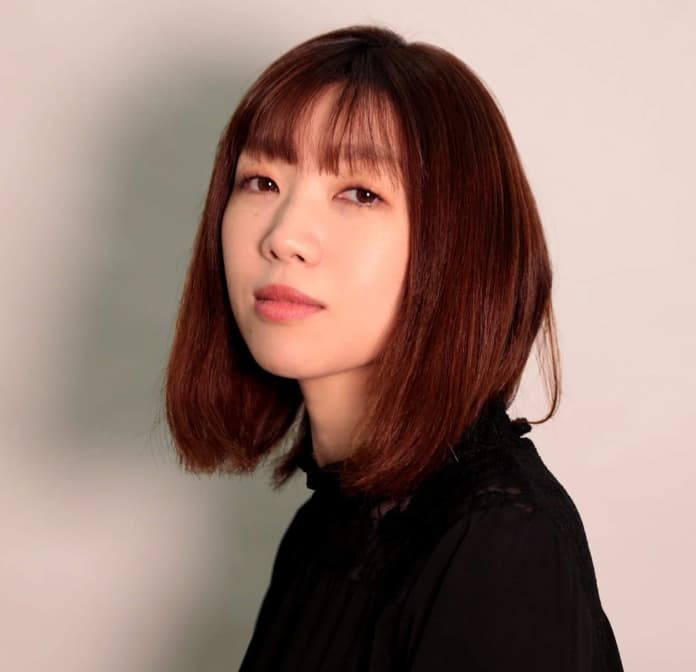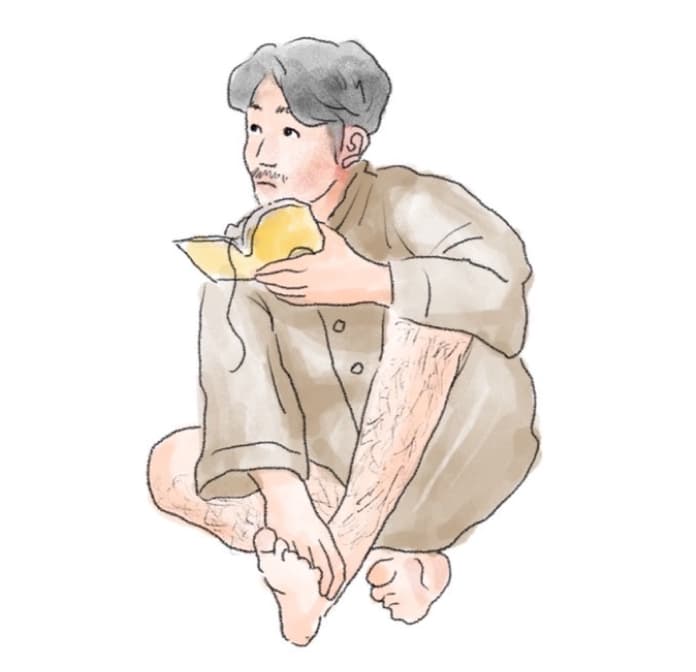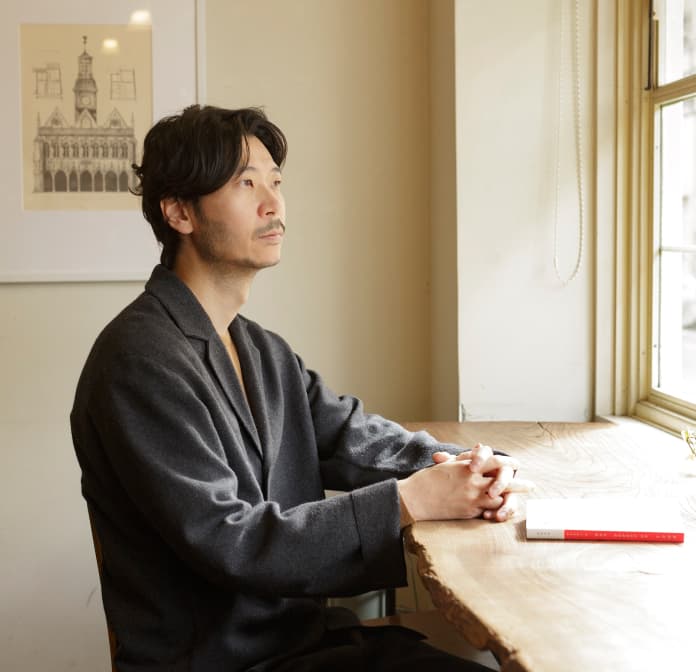“Watermelon!”
Sitting side by side on the veranda, legs dangling, Yuto and the girl took giant bites into the watermelon wedges his gran had chilled for them. The juice smeared all around their mouths.
“Want some salt?” Yuto looked over at the girl.
“Does it make it taste good?”
“It’ll be a lot sweeter.”
“Really?”
Yuto sprinkled a bit of salt on her watermelon, and the girl shrieked with laughter.
“Wow, it’s so yummy.” When she looked up from her watermelon, she was sticky with juice from chin to neck. “After we finish this, are we gonna play again?”
“Hmm, I dunno…” Yuto said. He pursed his lips and sent watermelon seeds flying into the garden: ptui, ptui, ptui. The girl squealed with delight and copied him. Yuto’s seeds were flying further than hers; the girl frowned and then spat one in his direction with a sly grin.
*
“What are you smiling to yourself about? Fond memories?” Sasaki’s voice brought him back to the present moment. “Well, I should be heading back soon.”
She stood up to ferry the dishes back to the kitchen for washing up, but when Yuto told her he would take care of it, she grinned and let him take charge of the dishes and cups.
Yuto dried the dishes his gran washed, wiping them off with a plain white tea towel, and then he went back to the living room and sent Hiroka a message to say he was in Iwate.
Having fun? she texted back.
When he replied Sort of, she sent back an expressionless face emoji and nothing else after that.
By nine pm or so, Gran was ready to go to bed. “Rest, you must be tired,” she urged, so Yuto went into the tatami guest room and got into the futon she had laid out for him.
There was a monkey painted on the sliding fusuma door, and he had the odd feeling it was watching him; he rolled over onto his back. A cord dangled from the centre of the ceiling light, which was shaped like an upside-down tulip.
Staring up at the ceiling, he noticed the sinuous eddies of the wood grain. The lines looked like they were creeping steadily further apart, and he got the same feeling of unease that used to come over him so long ago, when he had slept here next to his gran. To shake it off, he tried to think about something else, and the girl he had remembered earlier sprang to mind. Her hair had been cut in a short bob, and she had worn some kind of yukata, he thought, sifting through hazy recollections. Slowly, a few more details came back to him: the watermelon they’d shared had been so delicious, and they’d waved sparklers around in the garden as well.
It was way too early to fall asleep—he got up and slid the fusuma open. The adjoining room was also tatami, with sliding glass doors at the end which gave onto the garden on the west side of the house.
He inched a glass door open, and the verdant scent of the night swept in. There was a gibbous moon, shining brightly nevertheless, and the scattered stars seemed to cluster around it. Yuto breathed in deep and savoured the cool breeze. In the absence of artificial light, he was surrounded by surprising darkness.
No car noise, no human voices, only the ti-ro, ti-ro of crickets chirping to his right and left. Time passed slowly; he felt as though he were suspended, floating in a magical night that would never give way to dawn.
Still, he began to feel the chill, and he knew he should get back to bed. When he lay down again, his head felt cool; the breeze from outside lingered pleasantly on his skin, and he closed his eyes. His body heat was gradually warming the futon.
As consciousness receded, he sensed a vague presence by his side.
“It’s been a while.” It was the voice of a child, which sounded familiar. “So you can’t get to sleep?”
“Yeah.” Oddly, Yuto didn’t feel at all scared. “I was just thinking about back when I was little. I remember being really happy back then.”
“Are you happy now?”
Yuto hesitated. “Uh, I don’t really know…”
“Mm.”
“My friend’s getting married.”
“Mm.”
“He seems so happy.”
“Mm.”
“But I feel like things haven’t been going so well for me lately...”
“Mm.”
“I’ve been with my girlfriend for three years, but I still don’t really get her.”
“Mm.”
“When we go out, I try to take her where she wants to go, at a time that suits her, but by the end of the date she’ll be kind of sulky.”
“Mm.”
“I always do as she says, you know?”
“Mm.”
“I really wonder whether we’re okay.”
“Mm.”
“It’s hard to judge, I guess.”
“Mm.”
“I feel at home here. But I’ve been away too long.”
The girl listened quietly, as he vented all the worries that lurked at the back of his mind.
When Yuto woke up, it was after noon.
The fusuma were wide open, and the sun angled in through the glass doors to reach the room he lay in. He sat up unhurriedly; he felt much lighter than usual. Maybe the dinner last night had done him some good, or maybe it was that he’d slept well for the first time in ages...
Yawning, he headed for the living room, and his gran asked him, “Do you always sleep in this late?” with a wide smile. Breakfast was on the table, and as Yuto briskly stirred his natto, he told his gran about his experience of the previous night.
“Gracious, that was our zashiki-warashi,” Gran said cheerfully.
“Huh? Zashiki-warashi?”
“Your mum used to play with her all the time too.”
“What—seriously? There’s a zashiki-warashi in this house?”
“Didn’t you know? She’s been here all along.”
He remembered the folktale his gran had told him when he was a child. The first time he heard it, it had terrified him. The irrational fear had stayed with him, unconsciously associated with his gran’s house; maybe it had contributed to keeping him away.
Out of nowhere, little footsteps could be heard, scampering about in the hallway; startled, he turned to his gran. With a calm smile, she looked toward where the sounds were coming from.
His childhood terror came rushing back to him. What if the zashiki-warashi left this house? He looked pleadingly in the same direction.
“Oh, that’s right,” Gran began, “today, Sasaki said she’d take me out in the car. Since you’ve come all this way, how about we take a little outing before you go?”
As she looked at him eagerly, he chewed on a tomato with unnecessary force to quell his anxiety and nodded.
Sasaki took the wheel, telling Yuto in the same lively manner as yesterday, “Isn’t it funny how if you live close to a tourist spot, you don’t tend to go there?”
Sitting next to him, Gran was looking out the window with a radiant smile. “I’m so looking forward to it!”
The place they drove to was called Denshoen Park.
They passed through the entrance, which was a large barn with a thatched roof. The breeze carried smells that he wasn’t used to; he got a whiff of sand and fresh green leaves.
“It’s like a museum,” he muttered. Sasaki guided them around, reading out the descriptions of the buildings. They saw a waterwheel, a well, and replicas of toilets and baths used long ago. Visitors could also try their hand at making the small wooden votive plaques called ema.
With a twinkle in her eye, Gran mentioned that she knew the perfect spot for Yuto to visit.
There was a building known as the magariya house, which had a lived-in feel to it. Once they were inside, Sasaki led them on at a brisk pace. Yuto followed reluctantly: through a doorway, the walls were shrouded by bunches of motley cloths in overwhelming numbers, and he stifled a yelp. Struggling against his rising sense of dread, he couldn’t take in much of what Sasaki said, but apparently they were Oshira-sama dolls. They were made from sticks of mulberry wood, with the head of a girl or her horse carved into the end; visitors dressed the mulberry sticks in cloths upon which they had written a wish. The dolls numbered a thousand or so.
“Come, come,” Gran called, beckoning Yuto to the room where the zashiki-warashi were. “See, have a look over here,” she said, taking him by the hand to pull him along.
In the gloom, written in hiragana were the words: Oku-zashiki. Gran grinned and waved him inside first.
Yuto walked on nervously. The small room’s sliding door was open, and as he walked in, a little shadow floated hazily in the orange light.
A grunt burst out of him as he edged closer—a cut-out of a child with a bob was silhouetted on a paper lantern. She was looking at him with eyes full of mischievous calculation, one hand spread palm open in front of her.
“Honestly,” he groaned. When he turned around, he saw his gran giggling like a child.
“That’s a zashiki-warashi.” Sasaki was struggling to keep a straight face as well.
“It’s only a display,” he muttered under his breath, trying to put a good face on it, but his deep-seated worry welled up again, stronger than ever—something terrible could happen to his gran, and Sasaki too, if the zashiki-warashi moved out some day...
After they left Denshoen Park, Sasaki took them to a popular Jingisukan restaurant.
Yuto ordered the basic set meal (the “assari”), and he was served raw lamb that looked beautifully tender. Sasaki and his gran taught him the best way to cook it: the cabbage, onions, bean sprouts, and carrots were placed around the edge of the round grill, leaving a gap in the centre for the meat. The lamb didn’t have the strong gamey smell of mutton, and they could devour it the instant it was done.
It was getting on for evening by the time they left the restaurant, and Sasaki laughed. “I can’t tell if that was lunch or dinner.”
Gran laughed as well, saying that good food was good to eat at any time. “Yuto, why not buy a few souvenirs to take back with you?” she suggested.
He said he didn’t mind either way, and Sasaki drove them to a roadside station where souvenirs were sold.
The local produce hall had a huge variety of things, from turnips and wasabi to unrefined doburoku sake and beer; he found himself walking around in circles inside the shop, repeatedly picking things up and putting them back again.
“Oh my, they’re here as well!” Gran called out.
Yuto went to her: Gran was holding a zashiki-warashi key ring. The tiny girl doll was made of soft, springy material, dressed in a red kimono tied with a yellow obi. She had black hair, cut in a short bob, and her eyes were big and round.
Gran bought him three as souvenirs. “One is for you. One’s for your mum. And the last one, you should give to someone that makes you feel happy when you’re with them.” She handed him the bag.
Someone that makes me feel happy when I’m with them ... He thought about it, and sent a message to Hiroka:
What would you like as a souvenir?
It didn’t change to ‘Read’.
“Could I come back to Iwate another time...” he wondered aloud.
A smile came to his gran’s face at his soliloquy. “That would be great.”





